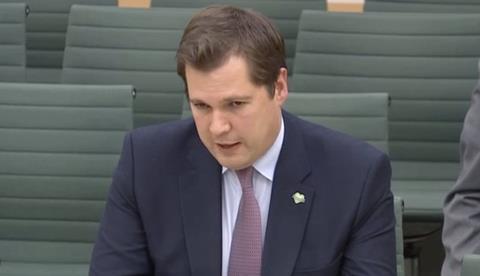On eve of Grenfell report, housing secretary Robert Jenrick says he is close to ‘naming and shaming’ firms
The government is close to “naming and shaming” those owners of buildings who have yet to take any action to remove dangerous cladding from high-risk residential buildings.
On the eve of publication of the first report into the Grenfell tragedy, housing secretary Robert Jenrick told MPs on the local government select committee it was “not acceptable” that the owners of some buildings featuring ACM cladding had no plans in place to remove the material.
A public inquiry into the tragedy which killed 72 people is due to be published tomorrow and is set to be critical of the London Fire Brigade’s response to the fire.

The report will also say the main reason the fire in June 2017 spread so quickly was the presence of aluminium composite panels and melting and burning polyethylene.
Former high court judge Sir Martin Moore-Bick, who is heading up the Grenfell inquiry, said there was “compelling evidence that the external walls of the building failed to comply with requirements” and that instead of resisting the fire they “actively promoted it”.
Jenrick (pictured) admitted to MPs that 22 privately-owned high-risk residential buildings still had no plans in place to have their ACM cladding removed.
A £200m fund launched in September to help building owners replace ACM cladding with safer alternatives closes in December.
Asked why owners had been given just three months to access the fund, he said he wanted those responsible for removing suspect cladding to move quickly. He said: “There’s no reason for building owners not to apply for funding.”
He added: “The present situation is not acceptable. I have said it is frankly shameful if building owners do not take advantage of this [fund], bearing in mind the taxpayer is paying for it.”
The minister, who this morning announced that Dame Judith Hackitt would advise the MHCLG on the new Building Safety Regulator, said the government was “working through any issues” building owners might have so that they can apply for funding and get work going “as soon as possible”.
But he warned: “We are close to the point of naming and shaming those building owners who haven’t applied, who haven’t taken action and where there are no acceptable extenuating circumstances.
“And we are considering what other more meaningful steps, besides naming and shaming, we could take. But I’m hopeful building owners will come forward.”
But Jenrick confirmed the government would still pay for remediation in cases where building owners had not applied. “There is no question of us walking away from that commitment,” he said.
The latest government data for the 168 privately-owned residential buildings featuring ACM cladding showed owners of 24 had started remediation, 76 had a remediation plan in place but had yet to start work, 46 had announced an intent to remediate and were developing plans, and 22 had what the government called “unclear remediation plans”.


























No comments yet